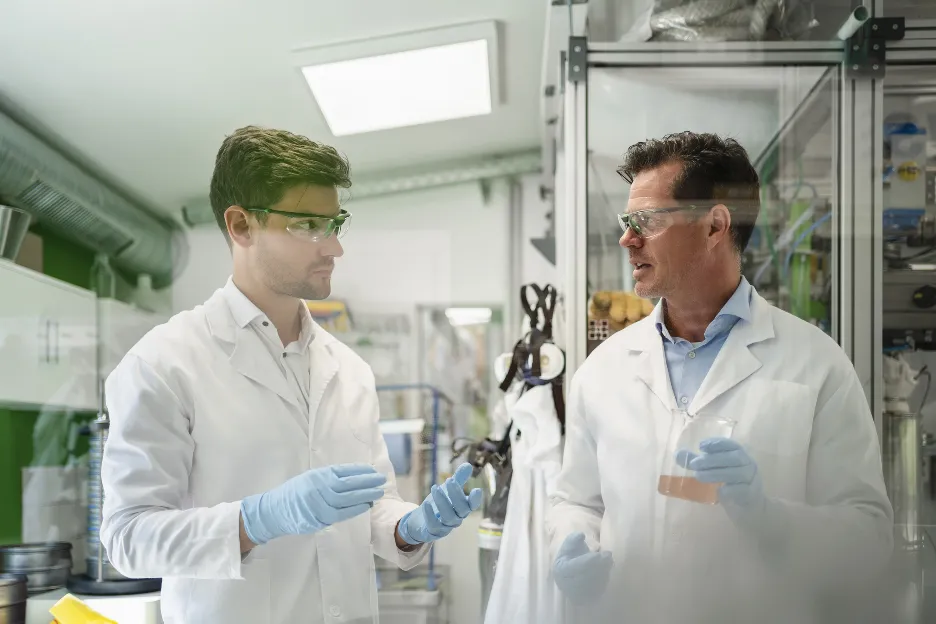Making the world a better place
Championing a more sustainable, equitable, and open future.

The chemical sciences have a critical role to play in the global challenges we face and in the technological advances being developed to help meet these challenges.
Chemistry makes a significant contribution to the UK economy, so it is vital that government creates the right conditions for chemistry-using companies, including small and medium-sized enterprises (SMEs), to flourish and educate the current and future chemistry workforce.
We need the new government to support science, from discovery to applications, to effectively tackle climate change and ensure that chemicals, resources and waste, and environment policies are informed by the best evidence and up-to-date science as possible. The UK needs to move towards a circular economy to create a healthy environment for healthy people and wildlife.
We are calling on the UK Government to place science and technology at the heart of the political agenda to create a resilient, sustainable economy and allow UK science to thrive.
We’re calling on the Government to:
£83 billion
annual contribution of the chemistry workforce to UK GDP
£39 billion
chemistry sector's average contribution to GVA
Data from research by Cambridge Econometrics for the RSC in 2020 for the period 2013-19.
Catalyse growth across the UK by utilising chemistry's economic contributions
Enable chemistry’s contribution to the economy, society and environment using sector insights, and equipping the future workforce with the technical skills our economy needs.
- Provide clarity and certainty on longer-term and ambitious R&D investment to boost confidence in the UK for public and private investors, and high-skilled workers, to locate their lives and businesses in the country.
- Aim for the UK to be a leading G7 country in R&D investment and to be among the top science and innovation nations globally.
- Promote international collaboration by continuing to fund and support participation in international funding programmes like Horizon Europe and Framework Programme 10 (FP10).
- Ensure that increased investment and support are felt across all regions and nations of the UK and support a science culture that prioritises good scientific practice and individual wellbeing, as well as heightening participation in science and innovation.
- Enable the UK to attract and retain the most talented researchers and innovators, through an internationally competitive visa scheme and by supporting a positive and inclusive science culture.
- To guarantee the long-term supply of skilled workers for the sector, the Government should ensure education, skills and higher education policies enable the full growth potential of chemistry sectors, maximising their contribution to economic growth.
- Urgently address the financial sustainability of higher education in a way that ensures quality chemistry teaching and research remain available in all regions and nations to meet economic, employer and student needs.
- Reverse the decline in investment in staff training for workers to keep pace with the skills needed in modern science – focusing on the provision of green skills for sustainability and clean technology.
- Ensure lab space and infrastructure responds to regional R&D strengths has a place in national narratives and strategy to provide long-term confidence and motivation to key stakeholders who can mobilise investment into this space.
- Develop policy to identify lab space needs in areas of scientific space.
- Ensure there are enough planners to deal with the demand of planning applications to decrease the risk of delay and equip them with guidance for science spaces to make the planning process more efficient for lab space developments.
- Ensure the science budget fully enables maintaining, repairing and upgrading existing infrastructure and facilities, not just for building new infrastructure.
Provide a world-class chemistry education for all at all stages of learning
Invest in school-level chemistry and science education to guarantee an effective labour pipeline and maintain the strength of the chemical sciences.
- Ensure the science curriculum is up-to-date and imparts subject knowledge as well as technical and transferrable skills.
- Allow for the curriculum to features content on real-world concerns and challenges that will interest students; more diverse representation and global contexts.
- Support schools to provide hands on practical activities as a part of their curriculum through sufficient funding for consumables and chemicals as well as enough science technicians.
- Foster a sense of identity and belonging in the chemical sciences through better use of contexts, examples and role models; students see that a future in chemistry is ‘for people like me’.
- Promote a variety of routes into the chemical sciences sector including greater uptake of vocational training options that award recognised qualifications.
- Adopt a ‘single route’ science qualification to the age of 16, giving learners equal opportunity to study science by addressing existing gatekeeping and perception problems.
- Broaden children’s horizons and ambitions by ensuring they understand the wide range of careers and opportunities that science enables and provide teachers and careers professionals with the knowledge to talk about the full range of academic and vocational routes to those careers.
- Ensure higher education is accessible around the country and to a diverse cohort of students.
- Ensure teachers and technicians have the resources, skills, expertise and motivation so that all students have access to an excellent chemistry education.
- Address teacher shortages with financial incentives (such as bursaries) and improve teachers' working conditions to ensure retention of the current workforce and attract new teachers.
- Develop plans to ensure cost is not a barrier preventing teachers’ access to subject-specific CPD in the sciences and invest in a systematic approach to subject-specific CPD in the sciences.
- Review science technician pay and conditions, considering what policy measures might help to attract and retain science technicians in the future.
Effectively manage chemicals to protect our health and environment
Establish effective leadership and oversight to enable a robust and sustainable economy and drive a just transition to a circular economy.
- Continue to support UK leadership in UNEP’s work in global framework for chemicals (GFC) and the process of developing the UN Science Policy Panel (SPP) on chemicals, waste and pollution prevention.
- Devise a long-term roadmap and a stable policy environment to enable investment in research, development, commercialisation and manufacture of sustainable chemicals and materials, to benefit communities across the UK and achieve green economic growth.
- Work with the chemicals and materials sector to ensure the UK landscape supports this growth, from feedstocks to infrastructure and skills, to ensure the development of resilient UK supply chains.
- Develop and implementing policies shaping markets to enable the UK’s transition to sustainable chemicals and materials, including the leveraging of public procurement to create demand for sustainable chemicals and products manufactured in the UK.
- Implement comprehensive and adequately resourced monitoring programmes for CECs in water, soils, sediments, wildlife and humans. Monitoring is essential to understanding the scale of pollution, identifying hot spots and assessing long term trends..
- Enforce a stronger ‘polluter pays’ principle by making additional treatment to remove CECs from urban wastewater mandatory. This could be funded via extended producer responsibility of major polluters of CECs (e.g. industries that produce or use problematic CECs) that consequently end up in wastewater streams.
- Commit to identifying and tackling the other major diffuse sources of CECs in waterbodies, such as pollution from road run-off, waste emissions and agriculture.
- Invest in indoor air quality research and put in place long-term, systematic monitoring of indoor air quality and health.
- Create a Chemicals Strategy that would provide policy direction for chemicals, waste, and pollution prevention, and build national confidence in the UK chemicals regulation regime.
- Ensure the many hundreds of sources of PFAS are reported and captured in a national inventory.
- Identify, test, and regulate the pathways of PFAS from factory emissions and product-related waste to surface and ground waters through tighter environmental standards.
- Establish new statutory action standards for PFAS in drinking water of a maximum concentration of 10 ng/L per single PFAS and 100 ng/L for the overall summed concentration of all PFAS.
Please write to your newly elected MPs to ask them to support the issues that matter to our community.
Explore our work
Global challenges and technological advances bring both new possibilities and uncertainty – and the chemical sciences have a critical role to play. But what will that role be? How can we maximise the impact we make, making the world a better place? And what should we do to create a stronger, more inclusive culture for research that enables new discoveries?
We set out to answer these questions and chart a course forward, working with our global community and partner organisations, through original research, surveys, events, reports, campaigns, and collaborative initiatives, setting out how the chemical science community can enable a more open, more sustainable, and more equal future for everyone.

Sustainability
Chemistry drives progress towards a more sustainable world.

Discovery and innovation
The likely future of where chemistry’s greatest contributions will be – as well as the regulatory and funding environments needed to achieve them.

Science culture
Our wide-ranging work to make chemistry more welcoming to everyone.

Education
Everyone deserves an engaging, relevant, high quality, and inspiring chemistry education.

Public engagement and outreach
Learn about public engagement with the RSC and how you can get involved in engaging different audiences with chemistry

Get involved
Join us in making the world a better place.
